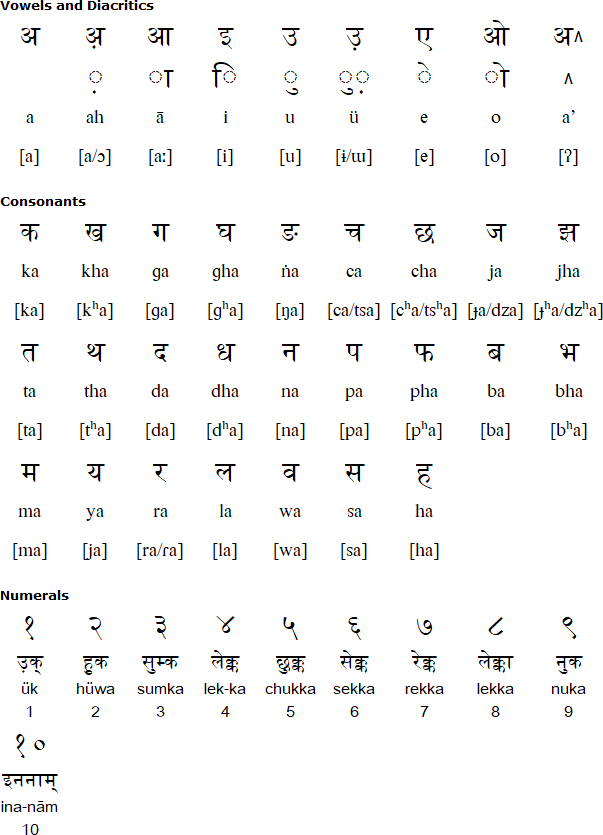Bantawa is a member of the Kiranti branch of Sino-Tibetan language family. It is spoken mainly in eastern Nepal, particularly in the Kosi, Mechi and Sagarmatha zones. In 2011 there were about 161,500 speakers of Bantawa in Nepal, where the language is officially recognised.
In Bhutan there are about 19,200 speakers of Bantawa, and there are about 14,400 in India, mailny in Sikkim state and in Darjeeling in West Bengal state.
Bantawa is also known as An Yüng, Bantaba, Bantawa Dum, Bantawa Rai, Bantawa Yong, Bantawa Yüng, Bontawa and Kirawa Yüng. Dialects include Eastern Bantawa (Dhankuta), Northern Bantawa (Dilpali), Southern Bantawa (Hatuwali) and Western Bantawa (Amchoke).
Bantawa is taught in some schools in Nepal and Bhutan, and is used in the media and literature. It is written with a version of the Devanagari alphabet, and used to be written with the Kirat Rai script.

Download an alphabet chart for Bantawa (Excel format)
झाराक मनाचि सावालोङ कि तोक्मायुओ सावादा मपुकहिदा नुतोकपोक कि अकहामओ मयुङ। खोचि खारु खोन्कि सिन्पोकएनान मताओ युङ खोन्कि अकछादाङका निमनाचिदा दक्छाबुवावात्नि याङमाचि मदोत।
ɟʰaːraːka manaːci saːwaːloŋa ki tokmaːjuo saːwaːdaː mapukahidaː nutokapoka ki akahaːmao majuŋa. kʰoci kʰaːru kʰonki sinpoksenaːna mataːo juŋa kʰonki akacʰaːdaːŋakaː nimanaːcidaː dakcʰaːbuwaːwaːtni jaːŋamaːci madota.
All human beings are born free and equal in dignity and rights. They are endowed with reason and conscience and should act towards one another in a spirit of brotherhood.
(Article 1 of the Universal Declaration of Human Rights)
Details provided by Biswajit Mandal (biswajitmandal[dot]bm90[at]gmail[dot]com)
Information about Bantawa
https://en.wikipedia.org/wiki/Bantawa_language
https://www.ethnologue.com/language/bap
https://openaccess.leidenuniv.nl/handle/1887/14326
http://robbie.eugraph.com/bantawa/report.html
Athpare, Bahing, Bantawa, Belhare, Chamling, Dhimal, Dumi, Khaling, Limbu, Sunwar, Toto, Wambule, Yakkha
Aka-Jeru, Angika, Athpare, Avestan, Awadhi, Bahing, Balti, Bantawa, Belhare, Bhili, Bhumij, Bilaspuri, Bodo, Bhojpuri, Braj, Car, Chamling, Chhantyal, Chhattisgarhi, Chambeali, Danwar, Dhatki, Dhimal, Dhundari, Digaro Mishmi, Dogri, Doteli, Gaddi, Garhwali, Gondi, Gurung, Halbi, Haryanvi, Hill Miri, Hindi, Ho, Jarawa, Jaunsari, Jirel, Jumli, Kagate, Kannauji, Kham, Kangri, Kashmiri, Khaling, Khandeshi, Kharia, Khortha, Korku, Konkani, Kullui, Kumaoni, Kurmali, Kurukh, Kusunda, Lambadi, Limbu, Lhomi, Lhowa, Magahi, Magar, Mahasu Pahari, Maithili, Maldivian, Malto, Mandeali, Marathi, Marwari, Mewari, Mundari, Nancowry. Newar, Nepali, Nimadi, Nishi, Onge, Pahari, Pali, Pangwali, Rajasthani, Rajbanshi, Rangpuri, Sadri, Sanskrit, Santali, Saraiki, Sirmauri, Sherpa, Shina, Sindhi, Sunwar, Sylheti, Tamang, Thakali, Thangmi, Wambule, Wancho, Yakkha, Yolmo
Page last modified: 23.04.21
[top]
You can support this site by Buying Me A Coffee, and if you like what you see on this page, you can use the buttons below to share it with people you know.

If you like this site and find it useful, you can support it by making a donation via PayPal or Patreon, or by contributing in other ways. Omniglot is how I make my living.
Note: all links on this site to Amazon.com, Amazon.co.uk
and Amazon.fr
are affiliate links. This means I earn a commission if you click on any of them and buy something. So by clicking on these links you can help to support this site.
[top]